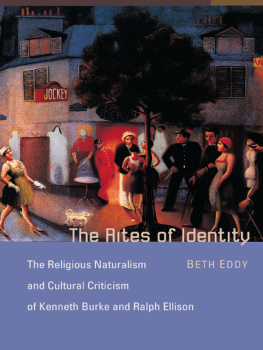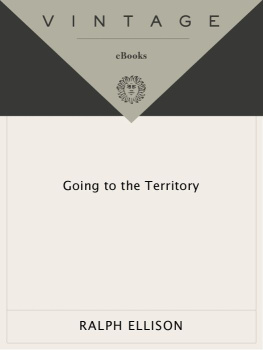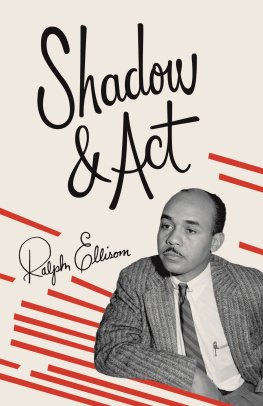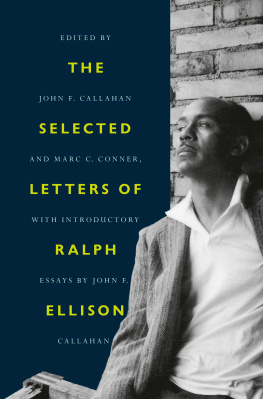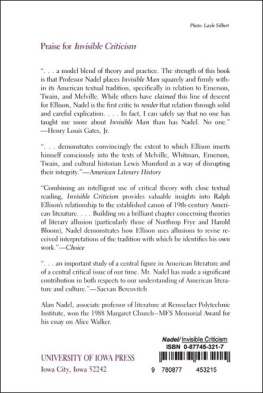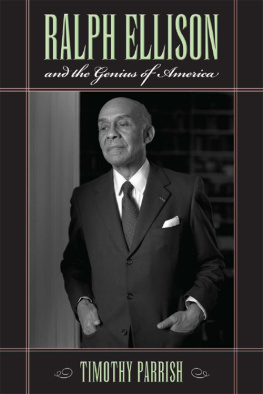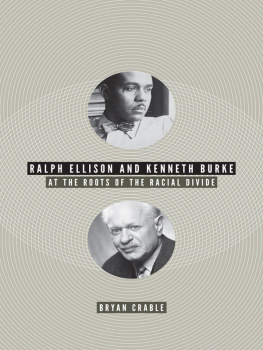THE RITES OF IDENTITY
THE RITES OF IDENTITY
The Religious Naturalism
and Cultural Criticism
of Kenneth Burke and Ralph Ellison
Beth Eddy
PRINCETON UNIVERSITY PRESS
PRINCETON AND OXFORD
Copyright 2003 by Princeton University Press
Published by Princeton University Press, 41 William Street,
Princeton, New Jersey 08540
In the United Kingdom: Princeton University Press,
3 Market Place, Woodstock, Oxfordshire OX20 1SY
All Rights Reserved.
Library of Congress Cataloging-in-Publication Data
Eddy, Beth, 1955
The rites of identity : the religious naturalism and cultural criticism of
Kenneth Burke and Ralph Ellison / Beth Eddy.
p. cm.
Includes bibliographical references and index.
eISBN: 978-1-40082-576-9
1. Burke, Kenneth, 1897KnowledgeReligion. 2. Ellison, RalphKnowledge
Religion. 3. CriticismUnited StatesHistory-20th century. 4. Religion. I. Title.
PN75.B8E34 2003
818'.5209dc21 2002044719
British Library Cataloging-in-Publication Data is available.
This book has been composed in Goudy and American Gothic
Printed on acid-free paper.
www.purpress.princeton.edu
Printed in the United States of America
10 9 8 7 6 5 4 3 2 1
TO IDA WALLER POPE
... all symbolism can be treated as the ritualistic
naming and changing of identity....
Kenneth Burke, Attitudes toward History
Here upon this stage the black rite of Horatio Alger was performed to Gods own acting script, with millionaires come down to portray themselves; not merely acting out the myth of their goodness, and wealth and successes and power and benevolence and authority in cardboard masks, but themselves, these virtues concretely! Not the wafer and the wine, but the flesh and the blood, vibrant and alive, and vibrant even when stooped, ancient and withered. (And who, in face of this, would not believe? Could even doubt?)
Ralph Ellison, Invisible Man
CONTENTS
ACKNOWLEDGMENTS
I would like to thank the Charlotte Newcombe Foundation for financial support of my research and writing. Thanks also go to Charles Mann and Sandra Stelts of the Rare Books and Special Collections at Pattee Library at Pennsylvania State University for assistance and advice on archival sources. I am also grateful to Michael Burke for access to many of those archival sources. The book benefits from the kind efforts of various people at Princeton University Press: Fred Appel, Linny Schenck, Madeleine Adams, and Sarah Green. I would like to thank my teachers and mentors, Jeffrey Stout, Henry Samuel Levinson, and Cornel West, for their inspiration, instruction, and support. Some of the debt I owe to them will be apparent to my reader, but the errors I managed on my own. To my colleagues who read this manuscript and talked with me about itDavid Craig, Eddie Glaude, Bill Hart, and Hannah SchellI offer my gratitude and continued friendship. Over the years Mark Larrimore has been teacher, mentor, colleague, and friend all in one. Thanks to my daughters, Lauren and Meredith, for giving me a reason to persevere. Most important of all, my love and respect to Jim Eddy, for being there for the long haul and the short-term crunch. This book would not have happened without him by my side and involved in my life.
THE RITES OF IDENTITY
CHAPTER ONE
IDENTITY AND THE RITES OF
SYMBOLIC ACTION
The skin is a line of demarcation, a periphery, the fence, the form, the shape, the first clue to identity in a society (for instance, color in a racist society), and, in purely physical terms, the formal precondition for being human.... It is a thin veil of matter separating the outside from the inside.
Andrea Dworkin, Intercourse
Closed societies are now the flimsiest of illusions, for all the outsiders are demanding in.
Ralph Ellison, Going to the Territory
Identification is compensatory to division. If men were not apart from one another, there would be no need for the rhetorician to proclaim their unity. If men were wholly and truly of one substance, absolute communication would be of mans very essence. It would not be an ideal, as it now is, partly embodied in material conditions and partly frustrated by these same conditions.
Kenneth Burke, A Rhetoric of Motives
TOO OFTEN, discussions that deal with personal identity issues, whether about race, gender, religion, or nation, descend quickly into an us and them opposition that ceases to do productive work and poisons the hopes of any participant for a satisfying resolution of conflict. Probably all of us have experienced the relief that comes from being able to get away temporarily from the conflicts we have with differing others. Playing poker with the boys on Saturday night can alleviate the ongoing domestic conflicts of married life. An Afrocentric school can educate young African Americans in a space free from the constant encroachments on self-esteem made in white supremacist environments. Churches, synagogues, and voluntary associations make space for us to have conversations and participate in activities premised upon views that we do not all share. Gentlemens clubs provide some with a comfortable retreat. Women sometimes find all-female classrooms to be places where conversations can finally get off the ground floor without being derailed at the level of definitions of terms. Although temporary separations like these are necessary to provide respite and sanity checks for the fatigued, permanent separations, even though they may be energized by a collective spirit, lead to cultural fragmentation. On the other hand, too often the only voices calling for an end to conflict have naive expectations or envision the assimilation of one party to another one without substantial change. Identities serve both as the insignia that clothe us in uniform to others eyes, either as friend or enemy, and as the fortresses that protect our most crucial first premises about our hopes, fears, and needs.
This book highlights the centrality of identity in Kenneth Burkes and Ralph Ellisons cultural criticism. It emphasizes the religious language in which both men cast their descriptions of the ways societies sustain, fail to sustain, and transform human identities. I aim to show the tremendous influence of Burkes ideas on Ellison and to show that influence both in Ellisons embrace of and in his criticism of those ideas. Although there are similarities in the language of the two men there are also important differences in their social perspectives.
On one level, I want to think about rhetoric. The relevant religious concern I address here is not about God, but rather, about the way we use our words about God on each other, to quote Burke. Burke finds rhetoric and identity to be inseparable subjects; in a section of his work titled Identity and Consubstantiality, he shows how the study of rhetoric is the study of
the ways in which individuals are at odds with one another, or become identified with groups more or less at odds with one another.
Why at odds, you may ask, when the titular term is identification? Because to begin with identification is, by the same token though roundabout, to confront the implications of division.
Ralph Ellison also writes, almost exclusively, about identity. His work centers on the great mystery of identity in this country, really on the level of a religious mystery.
Kenneth Burkes identity concerns focus on symbolic action, that is, on the rites that change human identity and maintain the connections holding together the discontinuities of human existence. Our basic principle, he states, is our contention that all symbolism can be treated as the ritualistic naming and changing of identity.
Both Burke and Ellison show how greatly the Americanness of American culture has been a matter of Adamic wordplayof trying, in the interest of a futuristic dream, to impose unity upon an experience that changes too rapidly for linguistic or political exactitude. In this effort we are often less interested in what we are than in projecting what we will be. I plan to spell out the details of their mutual preoccupations with identity, religiosity, and American traditions.
Next page
